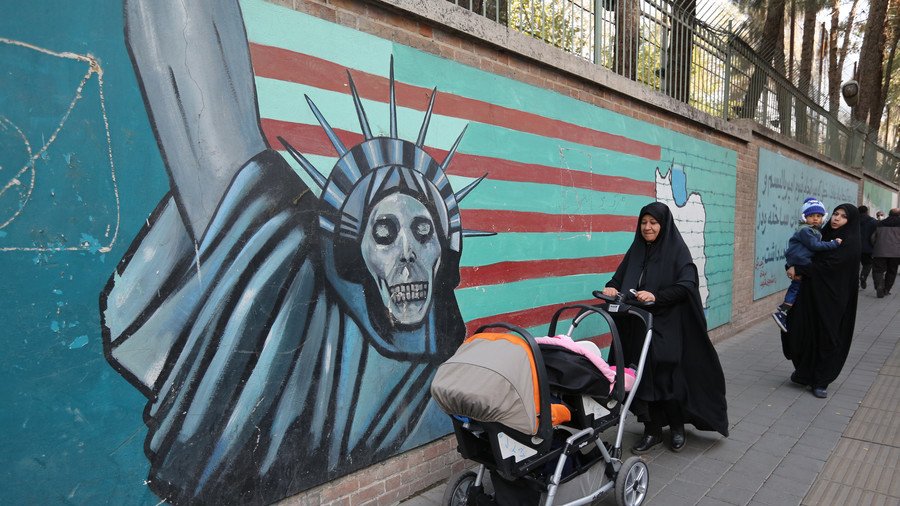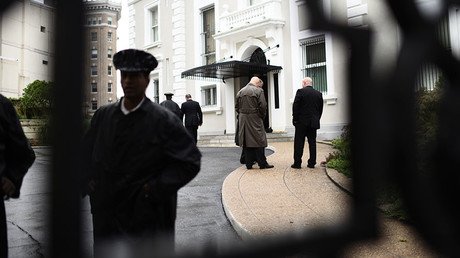The blacklist: Targets of new US sanctions against Iran

The US has re-imposed all of the sanctions against Iran that had been suspended under the 2015 nuclear deal. From airlines to oil firms, the list of companies and people targeted is exhaustive.
The sanctions, applied on Monday, reimpose financial penalties lifted under the 2015 Joint Comprehensive Plan of Action (JCPOA), which promised Iran some sanctions relief in exchange for a halt to its nuclear weapons program. President Trump withdrew from the deal in May, and has since reimposed sanctions in 19 rounds.
Described by Trump as the “strongest sanctions our country has ever issued,” Monday’s penalties target the Islamic Republic’s banking, energy and transport sectors, and according to Secretary of State Mike Pompeo, aim to “fundamentally alter the behavior of the Islamic Republic of Iran’s leadership.”
“Today we are re-imposing all sanctions that were previously lifted under the #Iran nuclear deal. This includes sanctions on energy, banking, shipping, and shipbuilding.” - @SecPompeopic.twitter.com/lleifimanW
— Department of State (@StateDept) November 5, 2018
Airlines
Only one airline is included on the Treasury Department’s 700-entry list: national airline Iran Air. In addition to the company itself, more than 65 of its individual aircraft have been sanctioned for being owned by the Iranian government.
Earlier rounds of sanctions targeted 31 aircraft operated by five other Iranian airlines, after the US claimed the airlines were using their planes to transport weapons to Tehran-backed proxy forces in Syria and Lebanon. The sanctions started to bite this summer, when the Iranian Labour News Agency quoted Iran Air CEO Farzanez Sharabafi as saying that as a result, the country’s aviation industry was in worse shape than those of Afghanistan or Iraq.
Banks
The US Treasury Department accused the Iranian government of using the country’s banking sector to fund “destabilizing activities,” from sending money to alleged proxy forces in Syria, Yemen and Iraq, to funding branches of Iran’s armed forces and weapons programs.
More than 70 Iranian and Iranian-linked institutions were targeted by Monday’s sanctions, including German-based Europaisch-Iranische Handelsbank AG; Day Bank, which allegedly provides banking services and support for Hamas, Hezbollah and the Palestinian Islamic Jihad; and a host of Iranian banks that provide services to Iranian armed forces.
With a swathe of the country’s banking sector sanctioned, Pompeo said on Monday that any revenue Iran makes from oil sales will be held in foreign accounts, and will only be used to purchase the very few non-sanctioned goods and those designated as humanitarian.
Shipping
Iran’s government-controlled maritime carrier and oil transportation company were both added to the Treasury Department’s list on Monday, as were a host of subsidiary and part-government-owned companies. Over 200 of these companies’ vessels were blacklisted, with the Treasury making familiar claims of involvement in “malign activities.”
One company shipped cargo to a cover company for Iran’s national Defense Industries Organization, while another moved Islamic Revolutionary Guard Corps troops around the Middle East, the US government says.
In its hurry to apply as far-reaching sanctions as possible, the US sanctioned at least one ship that no longer exists. The Sanchi, a crude oil tanker included on the list, sank after a collision with a Chinese freighter in January, and now sits rusting on the bottom of the East China sea.
I do know that Iranian #oil tankers play all kind of games, switching off their transponders. But U.S. appears to have gone a bit too far this time with its sanctions: the Sanchi sunk in January and the wreck was located at a depth of 115 metres (377 ft) | #OOTT#Iranhttps://t.co/hinyeHGkrq
— Javier Blas (@JavierBlas) November 5, 2018
Oil
A host of Iranian oil companies and their foreign connections and subsidiaries were included on Monday’s list. Pompeo boasted that more than 20 oil-importing nations have already cut their oil imports from Iran to zero, costing what he called the “Iranian regime” more than $2.5 billion dollars.
Pompeo threatened that the US would mete out “severe, swift punishment” to any nation that continues to buy Iranian oil, but granted a temporary waiver to eight countries - including China, Italy, Greece, and Turkey – to continue imports for the time being.
Iran’s oil exports have already dropped by nearly one million barrels per day since President Trump withdrew from the JCPOA and reimposed the first round sanctions, putting the squeeze on a sector that accounts for around 60 percent of the country’s overall budget.
President Hassan Rouhani said on Monday that Iran will somehow keep the oil flowing.
“We tell them that you will not reach any of your goals with regard to Iran’s oil sales,” the Iranian leader said. “You will neither be able to bring it to zero nor reduce it.”
Nuclear program
The Atomic Energy Organization of Iran also ended up on the US government blacklist, as well as 23 associated subsidiaries and individuals, owing to the organization’s intimate involvement in the country’s nuclear research programs.
Pompeo did say that temporary waivers would be granted to three unnamed non-proliferation organizations, who he said were working to oversee Iran’s civil nuclear program.
“Iran will never come close to getting a nuclear weapon on President Trump’s watch,” the senior US diplomat said.
In addition to exiting the nuclear deal and re-imposing sanctions, the US has hardened its line on Iran to the point of endorsing groups agitating for regime change. In August, the State Department established the Iran Action Group to support opposition groups, while National Security Advisor John Bolton – a known Iran hawk – promised to hit Iran with punitive sanctions and “other things” until Tehran toes the American line.
With all of the sanctions relief granted by the JCPOA now fully undone, Pompeo reiterated that Washington wants to cut a new deal with Iran. Perhaps not surprisingly, Tehran does not appear interested.
Like this story? Share it with a friend!














